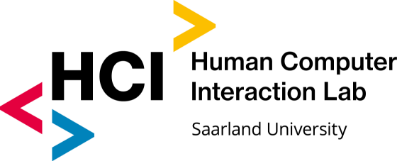Seminar: Interactive Computing with Augmented and Virtual Reality
| Type | Seminar (7 ECTS) | |
| Time | Wednesdays (16-18 pm), (Kick-off, 30 October 2019) | |
| Place | Bld. E1.7 (MMCI), Room: 0.08 | |
| Language | English | |
| Links | Course moodle, LSF |
Description
Augmented reality and virtual reality have been a topic of intense research for the last decades, but mostly restricted to research labs. In the past few years, massive advances in affordable consumer hardware and accessible software frameworks are now bringing AR and VR to the masses. A myriad of devices and applications are now finding their way to the end-users, suggesting AR and VR will be the next big platform for interactive computing. For instance, powerful head-mounted displays are getting affordable for mainstream users, such as the Oculus Rift or Microsoft Hololens; smartphones feature increasingly powerful cameras and on-board visual processing; and tracking systems that can be easily deployed in the living room feature a quality that long was restricted to high-end lab systems.
Indeed, augmented and virtual reality interfaces bring unique benefits for interaction, including a high degree of immersion, opportunities for more natural interactions, or seamless integration within a physical context. Prominent recent examples comprise AR games, such as Pokemon Go, , or computer-augmented lego bricks for children.
The objective of this seminar is to acquire basic conceptual, technical and practical skills in developing AR/VR applications. We will address the unique challenges of AR/VR on those three levels.
The seminar will cover the following topics:
- Conceptual basics of AR/VR interfaces: The VR/AR continuum
- How to design great AR/VR interfaces
- Understanding and applying tracking technologies and implementing them using state-of-the-art APIs
- Visual interfaces for AR/VR
- Haptic interfaces for VR/AR
- Designing and building interactions for AR applications
- Applications of AR/VR
Activities
This seminar combines conceptual basics and theory with a practical team project:
To make you familiar with important conceptual and technical foundations, the seminar will involve three reading activities, done individually by each student. For every reading activity, you will read one or more seminal research papers and hand in a brief written report that discusses these papers. Reports should summarise the key aspects, and more importantly, should include original and critical thought that show you have acquired a meta level understanding of the topic.
In the team project, you will work together with other students on developing your own AR or VR system or application. In the project, you will gain practical experience with important technologies for AR/VR, you will learn how to design of your own innovative AR/VR interface, and you will gain implementation experience by realizing a working solution. Creativity, ideation and experimentation will be essential aspects of the project phase. We will present a list of potential project topics during the kick-off session. Students can choose from these or propose their own ideas for projects. Our experience is that developing your own solution within a team of students can be a lot of fun and lead to impressive results; some of our past student projects have gained remarkable attention on the web and even have received awards (see for instance Interactive Jacket for Cyclists, Interactive Dancing Socks, Ambient Flower, Sprinter). We’ll help you to realize a great project.
Registration
Please note that because of the close individual supervision the number of participants is limited to 15!
Please register through the seminar portal offered by the computer science department https://seminars.cs.uni-saarland.de/seminars1920 . This is a master-level seminar, which can also be taken by Bachelor students from 5th study semester and above. Good programming skills are required in any one of these languages: JAVA, C#, Python, C++, Javascript/Node.js. Prior knowledge in HCI is recommended but not a prerequisite.
Literature and Materials
All the reading material and resources will be made available on Moodle.
People
Prof. Dr. Jürgen Steimle
Aditya Shekhar Nittala, MSc.
Adwait Sharma, MSc.


